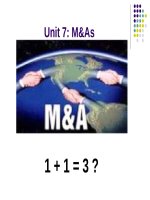TIẾNG ANH KINH tế mỗi NGÀY FINANCE AND THE ECONOMY
Bạn đang xem bản rút gọn của tài liệu. Xem và tải ngay bản đầy đủ của tài liệu tại đây (960.63 KB, 10 trang )
A
Personal finance
Traditional banking
‘I’m Elizabeth. I have an account at the
local branch of one of the big banks. I
have a current account which I use to
write cheques, make bill payments,
and so on. It’s a joint account with my
husband. Normally, we’re in the black,
but sometimes we spend more money
than there is in the account and we go
into the red and have an overdraft.
We have an overdraft facility – an
agreement with the bank to be in this
situation as long as the overdraft stays
within a certain amount. There are
charges that are taken from the
account if we go overdrawn. And of course we pay
interest (see Unit 32) on the overdraft. The interest
rate is quite high.
Note
35
BrE: current account, cheque account
AmE: checking account
BrE: cheque; AmE check
‘I also have a deposit account or savings account
for keeping money for the longer term. This account pays us interest but not very much, especially
after tax!
‘We have a credit card with the same bank too, plus other cards with other credit card companies.
Paying with plastic is very convenient. But we pay off the total amounts we’ve spent every month,
so we don’t pay interest on these, luckily.
‘We also have a mortgage – a loan to buy a house. This is with a type of bank called a building society.
Luckily, we were not affected by the credit crunch, when banks were much more hesitant to lend than
before, or negative equity, when house prices fell and left some buyers owing more on their mortgage
than their house was worth.’
B
Internet banking
‘In the old days, there was always a queue when I went to my bank, but now they offer internet
banking. Through my computer at home, I can check my account balances – the amount I have in
each account – and transactions – money going in and coming out. I can even apply for a personal
loan online. If there’s a problem, I can always phone the bank’s call centre (see Unit 24).’
C
Personal investing
Note
‘We have some unit trusts – shares in investment companies that put
BrE: unit trusts
money from small investors like me into a range of companies. One
AmE: mutual funds
type of unit trust here in the UK is in the form of an ISA – an individual
savings account – but there are many other financial products available for savers.
‘My husband and I have life insurance which would pay out if either of us dies. This is just one of the
insurance policies that we have.
‘I pay contributions into a private pension, which will give me a regular income for my retirement
when I stop working (see Unit 7). I’ve never joined a company pension scheme and the government
state pension is very small!
‘I’m lucky: I recently received a windfall, an unexpected one-off increase in the value of my pension
fund, when my pension company was demutualized (see Unit 12).
‘Some financial institutions now offer all these financial products.’
78
Business Vocabulary in Use Intermediate
Exercises
35.1
Look at A opposite and say if these statements are true or false.
1
2
3
4
5
6
35.2
You talk about the local ‘agency’ of a bank.
Americans refer to current accounts as cheque accounts.
A joint account is held by more than one person.
If you put €10,000 into a new account and spend €11,000, you are overdrawn by €1,000.
An account for saving money is called a safe account.
An account that pays a lot of interest has a high interest rate.
Lisa is looking at her bank’s internet site. Look at B opposite. What does she click on if she wants to
do the following?
ONLINE BANKING
My account
(a) See account balances and statements.
(b) See credit card statements.
(c) Check out our rates – highest of any major bank.
(d) Apply for our new low-interest credit card.
(e) Borrow up to £25,000. Apply online. Immediate approval.
(f) Read our list of fees and charges.
35.3
1 see what rate of interest she is
getting on her savings account
2 see if she is in the red on her
current account
3 see how much she owes on her
existing credit card
4 obtain a new credit card
5 understand why she has been
charged for something she
thought was free
6 apply for a personal loan
Read the article and answer the questions relating to expressions from A, B and C opposite.
COMPLAINTS ABOUT FINANCIAL PRODUCTS REACH RECORD LEVELS
Complaints about financial products and services leapt by
30 per cent last year to hit a record, underlining growing
dissatisfaction with banks and insurers. The Financial
Ombudsman Service (FOS) said the sharp rise was fuelled by
“sudden surges” in complaints about unauthorized overdraft
charges and loan payment protection insurance (PPI), driven
largely by media and internet campaigns.
The FOS said that during the year, it referred 123,089 new
cases for more detailed dispute-resolution work. A
spokesman said it had seen the number of mortgage and
banking disputes more than triple, while insurance
complaints had doubled.
There was a tenfold increase in complaints about charges on
current accounts, and a sixfold increase in complaints about
PPI, which has been heavily criticized amid claims that it is
overpriced and is mis-sold to people who would never be
able to make a claim. Meanwhile, the number of disputes
relating to travel and health insurance fell during the period.
Sir Christopher Kelly, chairman of the FOS, said: “This time
last year we had hoped we were starting to see a downward
trend in complaint numbers for the first time. But instead,
events during the year have led to the service receiving
record numbers of new cases.”
1 Which of these financial institutions are mentioned specifically?
a) banks
b) insurance companies c) building societies
2 Which of these financial products do the problems mentioned relate to?
a) pensions b) current accounts
c) loan payment protection insurance
d) life insurance policies
3 Which other financial products are mentioned?
4 For which products has the number of complaints increased? For which ones has it decreased?
Over to you
• Think of one advantage and one disadvantage of online banking.
• What is the biggest bank in your country? Is it a national or international bank?
Business Vocabulary in Use Intermediate
79
36
A
Financial centres
Financial centres
Financial centres are places where there are many
banks and other financial institutions. The financial
centre of London is called the City or the Square Mile,
and in New York it is called Wall Street.
Financial centres bring together investors (see Unit 32)
and businesses that need their investment in order to
function and develop. A speculator is an investor who
wants to make a quick profit, rather than one who
wants to invest over a longer period of time.
B
Traders in Wall Street
Stock markets
Note
Brokers, dealers and traders buy and sell on behalf of
these investors and, in some cases, for themselves or
the organizations they work for.
BrE: financial centre
AmE: financial center
Note
The chief executive of Advanced Computers went through this process:
1 ‘We needed to raise capital (see Unit 32) to develop and expand, so we decided to float the
company – in other words to go public.
2 ‘Our shares were issued and listed for the first time on a stock market that specializes in small
companies.
3 ‘Our shares were oversubscribed – there weren’t enough shares for all the investors who wanted
them!
4 ‘The shares rose by 10 per cent on their first day. The flotation was a big success.’
C
BrE: stock (countable)
list/quote shares on a stock market flotation
initial public offering (IPO)
AmE: stock (uncountable) list shares on a stock market
Stock markets outside the main English-speaking countries may be referred to as bourses.
Other financial markets
Products that are bought and sold on other financial markets include:
commercial paper – short-term lending to businesses (less than a year)
bonds – longer-term lending to businesses and the government (over several years)
currencies (foreign exchange or forex) – buying and selling the money of particular countries
commodities – oil, metals and farm products, for example cereals
These are traded directly between dealers over the telephone and computer networks. Some
commodities are traded in a central building called a commodities exchange. Shares, bonds and
commercial paper are securities, and the financial institutions that deal in them are securities
houses. Securities markets are also called capital markets.
D
Derivatives
A futures contract is an agreement giving an obligation to sell a fixed amount of a security or
commodity at a particular price on a particular future date.
An options contract is an agreement giving the right, but not the obligation, to buy or sell a security or
commodity at a particular price at a particular future time, or in a period of future time.
These contracts are derivatives. Dealers guess how the price of the related underlying shares – the
shares that the derivatives relate to – is going to change in the future, and use derivatives to try to
buy them more cheaply than they could otherwise.
80
Business Vocabulary in Use Intermediate
Exercises
36.1
A financial journalist talks about the importance of financial centres. Complete the gaps with
expressions from A opposite.
Now that a lot of buying and selling can be done
over computer networks, (1) b_ _ _ _ _s and
(2) t_ _ _ _ _s do not need to be in one place,
and (3) s_ _ _ _ _ _ _ _ _s can make money by
dealing over the internet from a computer in
their living room.
In New York, the area around (4) W_ _ _ _ _ _ _ _ _
is home to many (5) f_ _ _ _ _ _ _ _
i_ _ _ _ _ _ _ _ _ _s such as the New York Stock
Exchange.
London is one of Europe’s most important
financial (6) c_ _ _ _ _s: over 500 foreign banks
have offices in London. But more and more
of these financial institutions are not actually
based in the traditional area of the (7) C_ _ _ or
(8) S_ _ _ _ _ _ _ _ _ , as it’s often referred to.
As in New York, they are moving to areas where
property is cheaper.
36.2
Wall Street
Complete the sentences using appropriate forms of expressions from B opposite. Use British English.
1 A lot of companies that went bankrupt in the crash should never have
in the first place.
2 All three technology firms have announced plans to
more than £900 million
through stock market
.
3 The shares were
and we will see other companies in this field coming to the
market this year.
4 The new law would prohibit oil companies that invest in that country from
on US stock markets.
5 Around the world, businesses are being judged by
according to their ability to
earn profits.
6 The airline expects to make a small profit next year, its first since it
on the
bourses. (2 possibilities)
36.3
Use expressions from C and D opposite to describe the following.
1
2
3
4
5
6
7
8
9
a bank that makes companies’ shares available
a contract to buy 500 tons of wheat for delivery in three months
coffee and copper
dollars, euros and yen
lending to a company for less than a year
lending to a local government authority in the form of ten-year investment certificates
shares, bonds, etc. but not currencies or commodities
the London Metals Exchange
the right to buy shares in a company in one month’s time at $1.50 per share
Over to you
• What is your country’s main financial centre?
• What commodities are most commonly traded in your country?
Business Vocabulary in Use Intermediate
81
37
Trading
A
Market indexes
If there is demand for shares in a company, for example because it is doing well, its share price goes
up. The overall value of shares traded on a stock market is shown by an index (plural indexes or
indices). Here are some of the most important indexes:
1 London: FTSE: the Financial Times Stock
Exchange index – pronounced ‘Footsie’
2 New York: Dow Jones Industrial Average –
specializes in shares of long-established companies
3 New York: Nasdaq – specializes in shares of
hi-tech companies
B
4
5
6
7
8
Paris: CAC 40
Frankfurt: DAX
Tokyo: Nikkei
Hong Kong: Hang Seng
Shanghai: SSE
Market activity: good times …
1
buying and selling of shares
a large number
3
being bought and sold
4
big increases in value
5
famous companies that are
profitable in good times and
bad
6
rising level of prices
7
highest level ever
8
end of the working day
9
started the day
10
increasing by
11
ending the day higher
12
feelings are optimistic
13
to pass the ‘round’ number
of …
14
an important level, but one
that is not easy to get through
2
Home
News
Finance
Sport
Lifestyle
Popular
Trading1 has been heavy on the New York Stock Exchange, with very high
turnover2 of one and a half billion shares changing hands3. We’ve seen some
spectacular gains4, especially among blue chips5.
The bull market6 seems set to continue, after yesterday’s record high7 at the
close8 with prices continuing to rise today, having opened9 at 14,600 and
gaining10 121 points to close up11 at 14,721.
Sentiment is bullish12: some of
the dealers I’ve spoken to
expect the Dow to go through
the important 15,000 level13
sometime soon, but others see
this as a psychological barrier14
that will be difficult to pass.
C
Jan Feb Mar Apr May June July Aug Sept Oct
… and bad
1
Home
News
Finance
Sport
Lifestyle
Popular
There was panic selling1 on the New York Stock Exchange today as share prices
fell to new five-year lows2 in a massive sell-off3. We’ve seen some very big
declines4, with billions of dollars wiped off5 the value of some of America’s bestknown companies, and more than ten per cent of total market capitalization6,
closing down 1,095 points7 at 10,072.
The bear market8 seems set to continue, with more falls9 in the next few days.
Dealers are still very bearish10:
there is no sign of a rally11. If
prices continue to fall, we may
be looking at a real stock market
collapse12 or crash12, like the
ones in 1929 and 1987.
Jan Feb Mar Apr May June July Aug Sept Oct
82
Business Vocabulary in Use Intermediate
selling shares at any price
lowest level for five years
3
selling
4
decreases
5
taken off
6
the total value of shares on
the market
7
ending the day lower
8
falling level of prices
9
decreases
10
pessimistic
11
prices starting to rise again
12
very serious drop in the
value of shares, with very
serious consequences
2
Exercises
37.1
Complete the article using information from A opposite.
Yesterday in Asia, in (1)
, the Hang Seng
closed 1.6 per cent up at 15657 exactly. In Tokyo, the
(2)
was also up, at 15747.20. In
New York last night, the (3)
closed
1.8 per cent higher at 10824 exactly, and the hi-tech
(4)
index was 3.3 per cent up
at 3778.32. Turning now to Europe, in early trading
in (5)
the FTSE 100 is 0.1 per cent
down at 6292.80. The French (6)
index is also slightly down at 6536.85. The DAX in
(7)
, however, is 0.1 per cent higher
at 6862.85.
37.2
Use expressions in B opposite to answer these questions.
1 What are shares in companies like IBM, Shell, and Procter & Gamble called?
2 What is the activity of buying and selling of shares on a stock market?
3 How do you describe the situation on a day with twice as many shares sold as usual on a
particular stock market?
4 How do you describe dealers who think shares in general will gain ten per cent in one day?
5 What is the name for a period when the stock market index has gone from 20,000 to 25,000?
6 How do you describe dealers who think that prices will fall?
7 How do they refer to the idea that 30,000 on a particular stock market index is important but not
easy to get through?
37.3
Match the headlines (1–4) containing expressions from C opposite with the graphs (a–d).
1 TECHNOLOGY STOCKS
SEE BIG DECLINES
a
b
POINTS
$ PER TON
10,000
5,000
IN MORNING TRADE
4,000
7,500
3,000
2
3
SHARES CONTINUE THEIR
2,000
NEW-YEAR RALLY
1,000
2,500
12 NOON 1PM
COPPER PRICES AT
TEN-YEAR HIGH
4
5,000
PANIC SELLING
AS INVESTORS RUSH
TO SELL AT ANY PRICE
2PM
3PM
4PM
c
5 YEARS
AGO
10 YEARS
AGO
TODAY
d
POINTS
POINTS
10,000
6,000
9,000
5,500
8,000
5,000
7,000
9AM
10AM 11AM 12PM
1PM
1 2
JANUARY
3
4
5
6
7
8
Over to you
• Which company would you buy shares in today, and why?
• What might start panic selling on the stock market?
• What is the difference between a bull market and a bear market?
Business Vocabulary in Use Intermediate
83
38
A
Indicators 1
Finance and economics
Finance is:
money provided or lent for a particular purpose.
the management of money by countries, organizations or people.
the study of money management.
A company with money problems has financial problems.
High finance involves very large amounts of money used by governments and large companies. A
person’s or organization’s finances are the money they have and how it is managed, etc. The related
adjective is financial.
Economics is:
the study of the way in which money works and how it is used.
calculations of whether a particular business activity will be profitable or not. A profitable
activity is economic and an unprofitable one is uneconomic.
A government with money problems has economic problems.
Economic indicators (see below) are figures relating to how well
a country’s economy – system of money, production, etc. – is
working.
B
Note
Do not confuse ‘economic’ with economical. If something is economical, it is cheap to buy, to use or
to do. If not, it is uneconomical.
You don’t say ‘I’m studying
economy’ but ‘I’m studying
economics.’
Inflation and unemployment
Inflation is rising prices, and the rate at which they are rising is the inflation rate. The related
adjective is inflationary.
The unemployed are people without jobs in a particular area, country, etc. The level of
unemployment is the number of people without a job. Unemployed people are out of work, and
are also referred to as jobless (adjective) or the jobless, especially by journalists. When there are
not enough people available to work, there are labour shortages.
C
Trade
Note
The balance of payments is the difference between the money coming into and going out of a
country. The trade balance is the difference between payments for imports – goods and services
from abroad – and payments for exports – products and services sold abroad. When a country
exports more than it imports, it has a trade surplus. When the
Nouns: export, import
opposite is the case, it has a trade deficit. The amount of this
Verbs: export, import
surplus or deficit is the trade gap. If the trade gap gets bigger,
it widens; if it gets smaller, it narrows.
D
Growth and GDP
Economic output is the value of goods and services produced in a country or area.
Gross domestic product or GDP is the value of all the goods and services produced in a particular
country. GDP per capita is the total output of a particular country divided by the number of people
living there.
The size of an economy is also sometimes measured in terms of gross national product or GNP. This also
includes payments from abroad, for example from investments.
Growth is when output in the economy increases. The growth rate is the speed at which a country’s
economy grows and gets bigger.
84
Business Vocabulary in Use Intermediate
Exercises
38.1
Read the definitions (1–9) and write words from A opposite. The first one has been done as an
example.
1
2
3
4
5
6
7
8
9
38.2
A country’s system of money, work, etc.: economy
The study of this subject in schools, universities, etc.:
Adjective used to talk about profitable activities:
The opposite of 3:
Adjective meaning ‘cheap’:
The opposite of 5:
How money is used, and the study of this:
An organization’s money and how it is managed: its
Adjective related to 8:
An economics reporter is talking about the economic situation in China. Complete what she says
with expressions from B, C and D opposite.
‘China’s economic indicators show that growth is likely to continue at its current level, with a
of about 4 per cent per year over the next few years.
(1)
Unemployment is not a problem, with very few people (2)
. In fact, there are (3)
, for example in agriculture.
As far as the (4)
is concerned, China (5)
more
than it imports, but the (6)
will narrow as the cost of its
manufactured goods increases. China will continue to import more services than it exports, so the
(7)
in this area will continue to (8)
.’
38.3
Look at D opposite and complete the bar graph and the pie charts using the information.
The growth rate in China for the first ten years remained stable
at around 4 per cent per year. After that the economy took off
and a period of very fast growth followed, with 10 per cent
growth per year, dipping to 8 per cent nine years later. Growth
then picked up – at 10 per cent per year for the following nine
years, but reaching 12 per cent this year.
Thirty years ago, 75 per cent of GDP in China came from
agriculture, 20 per cent from industry and 5 per cent from
services. At that time, GDP was US$1,000 per person in today’s
terms. Today, GDP per person is US$5,500, 45 per cent coming
from industry, 45 per cent from agriculture and 10 per cent
from services.
China growth rate
12
11
10
9
8
7
% 6
5
4
3
2
1
0
30
years ago
20
years ago
10
years ago
this
year
China GDP
services
industry
agriculture
China GDP
30 years ago
China GDP
this year
Over to you
• What is the difference between a trade surplus and a trade deficit?
• What is the inflation rate at the moment in your country? Is it rising or falling?
• Which three countries currently have the highest GDP?
Business Vocabulary in Use Intermediate
85
39
A
Indicators 2
Going up
Journalists in particular use these verbs to describe amounts or figures that are going up.
1
2
3
4
5
6
B
BT SHARES ADVANCE IN ACTIVE TRADING
Shares in BT increased in value, and a lot
of them were bought and sold.
TRADE SURPLUS JUMPS TO RECORD LEVEL
The value of exports over imports is
higher than ever.
FUEL PRICES SET TO SKYROCKET
Prices for fuel are going to rise by a
large amount.
UNEMPLOYMENT LEAPS TO TEN-YEAR HIGH
The number of people without work is now
higher than it has been for ten years.
GOOGLE SOARS AS INTERNET GROWTH CONTINUES
Shares in Google have increased greatly in
value due to continued growth in internet use.
VW PROFITS UP AS CAR SALES
CONTINUE TO SURGE
Profits in VW have increased thanks to
rapidly rising car sales.
Going down
The verbs here are used to talk about amounts, figures, etc. that are going down.
7
1,000 JOBS AXED AS
DEFENCE PLANT CLOSES
A defence company has told 1,000 factory
employees that they are to lose their jobs.
EUROPEAN CENTRAL BANK
CUTS RATE IN SURPRISE MOVE
The ECB has reduced interest rates when this was
not expected.
9
SIEMENS EASES ON PROFITS WARNING
Siemen’s share price has gone down slightly after
they said that profits would be lower than expected.
10
SEPTEMBER RETAIL SALES PLUMMET
Sales in shops have fallen a long way in September.
8
11 GOVERNMENT SLASHES
INCOME TAX TO TEN PER CENT
12
C
EURO DIVES TO NEW LOWS
The government has reduced income tax by a large
amount to 10 per cent.
The euro is worth less in relation to other currencies
than it has ever been.
Peaks and troughs
If a series of figures rises to a level and then stops rising, it levels off or levels out and remains steady or
stable, perhaps before going down again. If it reaches a peak – its highest level – and then goes down, it
peaks at that level. If it reaches a trough – its lowest level – and then bottoms out, it stops falling.
D
Boom and bust
Demand is the amount of goods and services that people want in a particular period. A boom is
when there is rising demand, fast economic growth, falling unemployment, etc.
Stagnation is when the economy is growing slowly, or not at all. Stagflation is when there is slow
growth, but prices are increasing fast.
A recession is a period when there is negative growth – a period when the economy is getting smaller
because it is producing less. A slump is a very bad recession. A depression is a very bad slump. Boom
and bust is a period of growth and rising company profits followed by one with falling growth and
losses. (See also go bust – Unit 33.)
86
Business Vocabulary in Use Intermediate
Exercises
39.1
Look at these headlines containing words from A and B opposite and say whether the statements
about them are true or false.
1
Sales have risen by a small amount.
ELECTRIC CAR SALES LEAP
2
3
4
5
6
7
39.2
Sterling Plummets As
US Dollar Falls Slightly
The British pound has fallen a lot in
value, but the US dollar has fallen less.
POLES AIM TO SLASH NEXT
YEAR’S BUDGET DEFICIT
The Polish government wants to reduce
the difference between what it spends
and what it receives in taxes.
Brazilian President
Axes Finance Minister
The president of Brazil has asked the
minister to stay in his job.
ZIMBABWE INFLATION SKYROCKETS
Prices in Zimbabwe have risen sharply.
ELI LILLY SURGES ON HOPES
FOR DRUG APPROVAL
EL’s share price has increased because it
appears that a new drug it has developed
will be approved for use.
AMB JUMPS 13% ON BID HOPES
Shares in AMB have fallen because it may
be a takeover target.
Complete the crossword with expressions from C and D opposite.
2
1
5
3
4
6
7
8
9
10
11
Over to you
Across
1 the worst economic situation (10)
5 Inflation
when it reaches its
highest level. (5)
9 When a figure goes up to a level and
stays there, it
. (6, 3)
11 When output starts rising from its
lowest level, it
. (7, 3)
Down
2 a period when the economy is not
healthy (9)
3 worse than 2 down, but not as bad as 1
across (5)
4 If the economy gets smaller, there is
growth. (8)
6 rising prices without rising
growth (11)
7 a very slow economy (10)
8 If inflation doesn’t change, it remains
. (6)
10 a very positive economic
situation (4)
• Have banks in your country cut interest rates this year – or have they increased them?
• What is the difference between stagnation and stagflation?
Business Vocabulary in Use Intermediate
87









